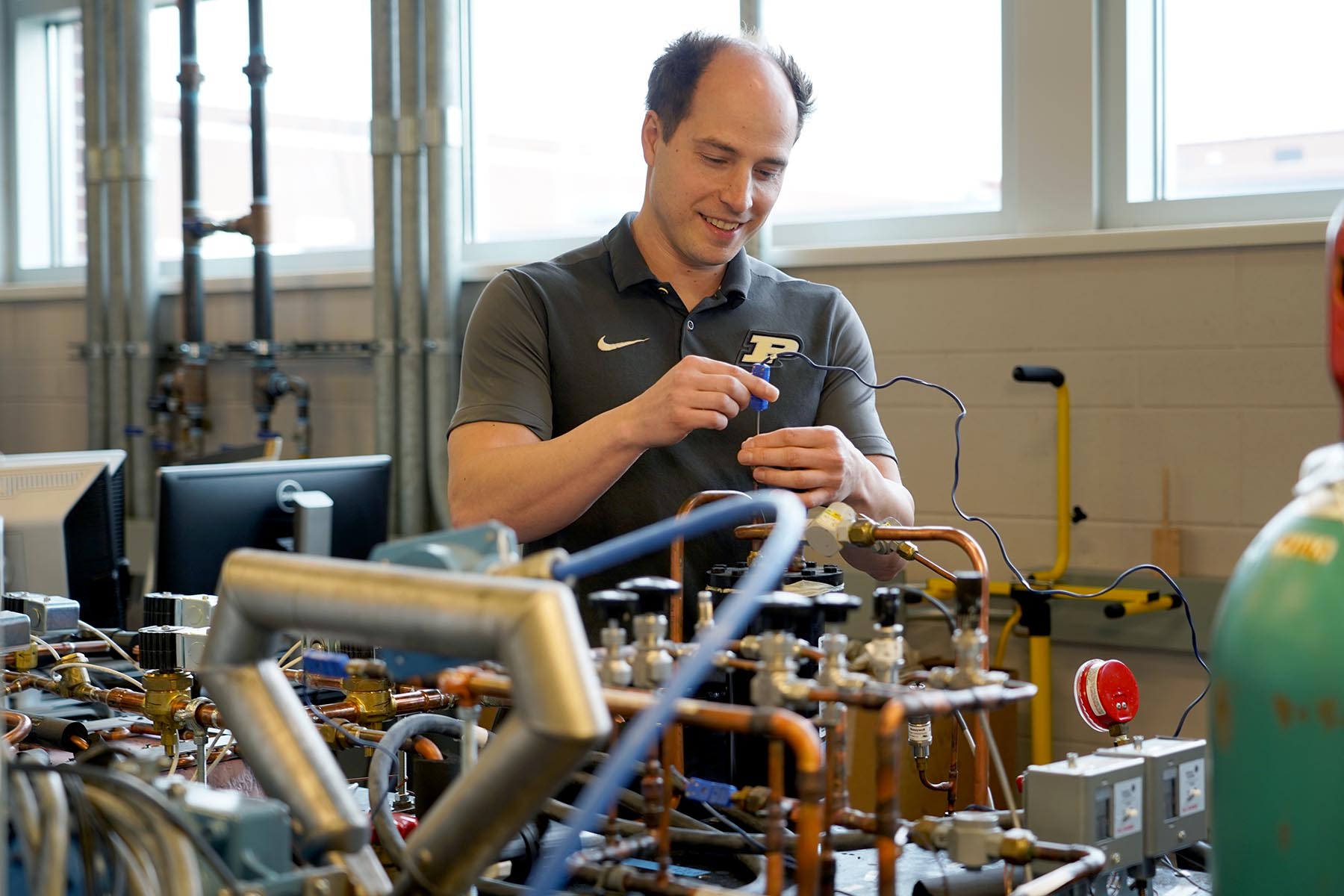Herrick Labs faculty receive funding to advance energy-efficient building technologies
Purdue’s Herrick Labs hosts the world’s largest academic lab devoted to heating, ventilation, air conditioning, and refrigeration (HVAC&R). Two Herrick faculty recently received funding from the U.S. Department of Energy (DOE) to advance HVAC&R technologies designed to be more sustainable, resilient, and energy efficient.
The DOE announced the grants in August 2023 as part of its Buildings Energy Efficiency Frontiers and Innovation Technologies (BENEFIT) program. According to their studies, residential and commercial buildings are the largest energy consuming sector of the U.S. economy, responsible for approximately 40% of the nation’s energy consumption, 74% of its electricity use, and 35% of its total carbon emissions. Estimates indicate roughly one-third of the energy used by buildings is wasted, at a cost of $150 billion annually. The DOE have allocated a total of $46 million for 29 different projects that address different aspects of the problem.

Davide Ziviani, assistant professor of mechanical engineering, is the principal investigator for one of the projects entitled “Commercial Cold Climate Rooftop Heat Pump Using CO2/Propane Cascaded with a Centrifugal System.” Ziviani will develop a cold climate heat pump rooftop unit that uses a cascaded loop system to accommodate a wide range of operating conditions and GWP refrigerant choices, improving heat pump RTU efficiencies in low temperatures. He will be collaborating with partners Trane Technologies, Copeland, and Oak Ridge National Laboratories. The award is for $2 million.
In addition to his work on cold-climate heat pumps, Ziviani is also pursuing more efficient high-temperature heat pumps, as part of a separate DOE project. He is also working with the Department of Defense on sustainable and resilient refrigerants for the battlefield.
Ziviani serves as the associate director of Purdue’s Center for High Performance Buildings, which collaborates with industry partners on new sustainable building technologies. His work was recently recognized by the American Society of Heating, Refrigerating and Air-Conditioning Engineers (ASHRAE) with their New Investigator Award, granting Ziviani $125,000 over three years to develop novel heat pump technology.

Neera Jain, associate professor of mechanical engineering, is co-principal investigator on two separate projects, both involving thermal energy storage.
The first is a $2.5 million project with the University of Wisconsin, entitled “Thermal Storage-Ready High-Performance Multisplit Heat Pump System.” They will develop a plug-and-play, multisplit HVAC system for heating and cooling that incorporates modular thermal storage units that together can reduce electricity power consumption by up to 50% for four hours at a time during periods of peak demand.
The second is a $2 million collaboration with Copeland, entitled “Multifunctional HVAC Platform with Modular Thermal Storage.” Copeland will connect an outdoor heat pump charged with propane (a low global warming potential refrigerant) with plug-and-play thermal energy storage modules to create an integrated residential HVAC platform for cooling, heating, and water heating, which will reduce the amount of energy needed for space conditioning and water heating by 40% overall.
At Herrick Labs, Jain has been experimenting with thermal energy storage modules, where heat is stored and discharged like electricity from a battery. The modules contain a phase-change material like paraffin wax. When excess heat needs to be rejected, it goes into the modules to melt the wax. Later, coolant is piped through the modules to re-solidify the wax and begin the cycle again. This thermal storage reduces the overall electricity needed to manage the heat of an HVAC system.
Jain recently received the 2023 Outstanding Young Investigator Award from the American Society of Mechanical Engineers (ASME) Dynamic Systems and Control Division (DSCD) for her work with both thermal systems and human-machine interaction.
